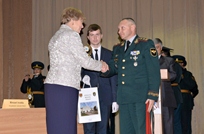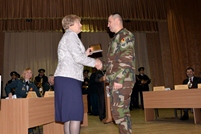Falesti District Free of PesticidesCHISINAU, October 26, 2016 — The National Army service members evacuated today the last amount of pesticide waste from Falesti district — over 15 tons — that were collected within September 29 — October 26, 2016. The event was attended by the leadership of the Ministry of Defense and General Staff, the National Army Commanding Officer Corps, ambassadors to the Republic of Moldova, and representatives of the local public administration. According to Col. Mariana Grama, deputy head of Logistics Directorate of the General Staff, in this period, the National Army team comprising of seven service members from the 2nd Brigade and the 22nd Peacekeeping Battalion, together with E.S. Field Services Veolia company from Great Britain, prepared for export about 200 tons of pesticides, from the district’s central warehouse from Hitresti village, Falesti district bypacking them, palletizing, marking, fixing, weighing andloading into trucks for transportation.. The source specified that the pesticides were collected from such villages as: Navarnet, Panzareni, Glinjeni, Bocani, Marandeni, Iscalau, Egorovca, Hitresti, Reutel, Pompa, and will be exported to Poland in order to be destroyed, at SARPI Dabrowa Gornicza incinerator. Col. Mariana Grama added that, starting with November 1, the pesticides’ evacuation and disposal will start at the warehouse from Bugeac village, Comrat district, ATU Gagauzia. These activities are part of the NATO/PfP Trust Fund Project on the disposal of dangerous pesticides and chemicals in the Republic of Moldova, financially supported by the Moldovan Government and countries such as: Romania, Poland, Turkey, Italy, Czech Republic, Norway, Finland, Estonia, Latvia, Bulgaria, and Japan. The main goal of the Project is to evacuate and dispose of 1,260 tons of pesticides from 15 regional central warehouses. So far, about 830 tons of pesticides were evacuated from the Republic of Moldova and destroyed. *** The NATO/PfP Project on the disposal of dangerous pesticides and chemicals in the Republic of Moldova was launched in 2003 and has three stages. Stage I — Within Stage II — Within Stage III — Starting with 2013, 640 tons of pesticides from 15 regional central warehouses, out of the planned 1,260 tons, were prepared for export, transported abroad, and destroyed. The cost for export, transportation, and disposal of 1,260 tons of pesticides is estimated at about 2.2 million euros. So far, 1.7 million euros, out of the 2.2 million euros needed to finish the project, were gathered from the Republic of Moldova, Romania, Norway, Ireland, Italy, Turkey, Czech Republic, Finland, Estonia, Belgium, Bulgaria, Luxemburg, Latvia, Poland, and Japan. |
 English
English




































